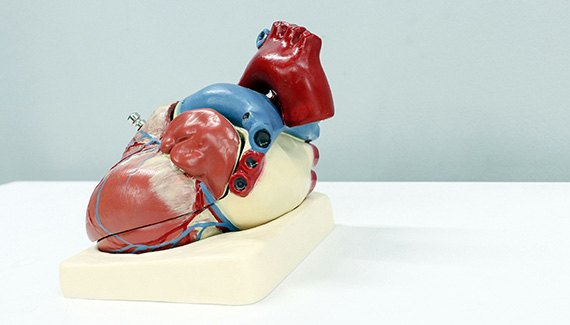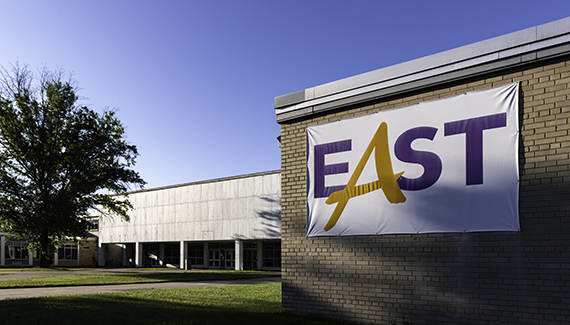|
|
|
|
 (Unsplash image / Ali Hajiluyi)
Is a cancer protein at the heart of cardiac scarring and disease?Research from the Medical Center’s Aab Cardiovascular Research Institute indicates that the tumor suppressor p53 might play a role in heart disease and scarring.
As reported in Circulation Research, researchers led by Associate Professor of Medicine Eric Small found that mouse heart fibroblasts multiply during a discrete window after injury, and fibroblast proliferation seemed to be tied to a lack of p53, the tumor suppressor protein that normally puts the brakes on cell proliferation.
In the study, which was supported in part by an Incubator Award from the University’s Clinical and Translational Science Institute (UR CTSI), Small’s team mimicked high blood pressure in mice using a left ventricle overload model.
p53 played a role there too.
Depression may be both cause and consequence of stress
(Getty Images photo)
A recent quantitative meta-analysis, published in the Psychological Bulletin, concludes that those who suffer from mental disorders are more likely to find themselves in stressful situations of their own making.
Study co-leaders Angela Santee, a psychology graduate student at Rochester, and Katerina Rnic, a postdoctoral fellow at the University of British Columbia, looked at 95 longitudinal studies, spanning over 38,000 study participants, and more than 30 years of research.
They found that psychopathology—such as mental illness or disorders, including depression—predicted dependent stressful life events (events that the person, at least in part, contributed to) more strongly than it predicted independent or fateful events.
Learn more about this “vicious cycle.”
Partnerships can drive change in K-12 schools
(University of Rochester photo / J. Adam Fenster)
Valerie Marsh, associate professor at the Warner School of Education and Human Development, collaborates with educators in K-12 schools to drive organizational and cultural transformations that directly enhance student outcomes.
As the assistant director for the Center for Urban Education Success, Marsh spearheads an educational partnership between the University and a neighboring Rochester city school. She emphasizes the importance of strengthening the connections among research, theory, and practice in this collaboration with East High School.
She collaborates with administrators, teachers, and students to conduct research aimed at enhancing East’s overall performance. This includes addressing longstanding challenges such as low graduation and literacy rates. Remarkably, within six years, the graduation rate increased from 33 percent to an impressive 85 percent.
Marsh discusses her work in a video.
Audio deepfake detective developing new sleuthing techniques
SBIR/STTR grant writing support
Hanover Research webinar: transitioning from K to R seriesFriday, November 17, 11 a.m.–noon
Virtual
In this session, Erin Vasudevan, grants consultant at Hanover Research, will discuss the NIH K series and the transition to the R series, with an emphasis on identifying when to apply to the R series, how to decide when to transition, and more. At the end of this session, attendees should have a strong sense of both the K and R mechanisms and strategies to employ when applying for them. Learn more.
Webinar: Leveraging cell phones in your researchTuesday, November 28, 11 a.m.–noon EST
Virtual
Many study teams are finding new ways to engage with participants through their cell phones, from delivering text-based interventions to developing and testing apps and more. In this webinar from the University’s Clinical and Translational Science Institute, hear from investigators who have looked at leveraging cell phones in their research work. Registration required.
Hybrid webinar: 10 things to know to thrive in an open access worldWednesday, November 29, noon–1 p.m. EST
Hybrid: Gamble Room, Rush Rhees Library or virtual
In August 2022, the White House Office of Science Technology Policy issued guidance to federal departments and agencies to make the results of taxpayer-supported research immediately and freely available. This means open access has become the expectation for scholarly outputs, such as data, articles, and books.
Join Moriana Garcia, the scholarly communication librarian for the River Campus Libraries, for a hybrid, interactive learning session on what open science/scholarship is, what kinds of practices exist, and the ongoing efforts at different levels (publishing, funding, research practices) to increase its adoption.
Register to attend. A complimentary lunch will be available for those who attend in person.
Seeds for CollaborationWednesday, November 29, 4:30–6 p.m.
LeChase Assembly Hall, G-9576, Medical Center
Seeds for Collaboration is a faculty and postdoc mixer sponsored by the Del Monte Institute for Neuroscience and the School of Medicine and Dentistry. The goal is to germinate and incubate discourse that will ultimately result in interdepartmental and crossdisciplinary collaboration, discoveries, publications, and grant applications. At each event, colleagues mingle for half an hour before three, five- to eight-minute talks. See the full agenda.
|
|
|
|
|